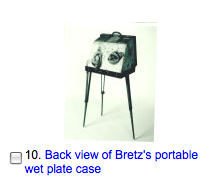 Each week brings announcements of archives launching new websites. Today both my email and Twitter told me about University of Maryland, Baltimore County’s new Digital Collections site. Who can resist peeking at new materials available online?
Each week brings announcements of archives launching new websites. Today both my email and Twitter told me about University of Maryland, Baltimore County’s new Digital Collections site. Who can resist peeking at new materials available online?
I have spent much of the past year learning the details of Search Engine Optimization. Usually shortened to SEO, this simply refers to the use of techniques which improve the traffic sent to a website via organic search. Want your webpage to show up at the top of the list for a specific search in Google? You want to work on your SEO.
So when I look at new archives website, I can’t help but keep an eye open for how well the site is optimized for search engines.
I hope that UMBC will forgive me for nitpicking their new site. A lot of their choices are great for SEO, but they also have room for improvement.
Things Done Well for SEO
- Home Page Title & Description: The site’s home page has a good meta description. This is the text displayed below the link on a search results page – as shown below:

- Unique Page Titles At Collection Level: Each photography collection homepage has a unique page title and a nice block of explanatory text. Google can only read words – so the more unique text on a page, the better the job Google can do in figuring out what your page is about. Example: Ardsley Park Album
- Good anchor text: (also known as link text) The words used in anchor text tells search engines information about the destination page. For example, the blue text below is anchor text.

Areas for SEO Improvement
- Unique Page Titles At Item Level: Individual images and documents all use a generic page title such as ‘UMBC | Digital Archive | Document Viewer’. Document Example: Accidental Death of an Anarchist Image Example: 10 year old Bootblack
- H1 Tags: In the HTML of each page, the dominant heading of the page should use the <h1> tag. This helps Google know the phrase you are targeting with this page. It is your 2nd best place to emphasize your content after the page title. In the case of the item pages, there seems to often be a headline type title at the top of the page – but it currently is not an demarcated with an <h1> tag.
- Think About Search Results and Indexing: Pages displaying results of internal searches on your site are not likely to be useful as indexed pages in Google. The thinking here is that they can dilute the focus on the item and collection level pages on your site if Google also has many search results pages in the index. If UMBC wanted their search pages to be indexed, then those pages’ URLs should be simplified and the search results pages need a page title that somehow includes the search criteria. There are two ways that I know of to disable this indexing – blocking via the site’s robots.txt file or via a robots meta tag in the header of the search results page. Both of these methods tell obliging search engines to not crawl certain parts of your site.
Final Thoughts
There are plenty of other things that UMBC could do to support this new website. They could create an XML sitemap of all their pages and submit it to Google (maybe they already have). They might re-title some of their pages based on using a tool like Google Insight to see what variations of a phrase is searched on most frequently. My goal here was to give you a taste of the sorts of things that catch my eye. Also, SEO is still more of an art than a science – so you will sometimes notice that what one SEO expert recommends is the opposite of what the next expert would tell you.
In many cases changes, such as the Unique Page Title at the Item Level mentioned above, may not even be possible due to software or programmer resource limitations. The trick is to take advantage of every option that is available. There are also trade-offs to be made. UMBC’s site provides some very slick interfaces for viewing the details of a group of documents, such as theater programs and other materials related to a theatrical production. The imlementation elegantly handles the situation of multiple scanned images which relate to a coherent set of documents. Sometimes you can’t have both your innovative UI and perfect SEO. Then it gets down to what your goals are for your website. Are you trying to make a specific community of existing users happy by providing them with tools they can use? Or does your mission focus more on reaching out to a broader audience?
There is no silver bullet to search engine optimization. It just takes knowledge of the available tools and techniques combined with a willingness to keep learning and experimenting. Like the ‘Do-It-Yourself-Woman‘ pictured above in the Nationaal Archief‘s photo I found out on the Flickr Commons, you too can learn the basics and do-it-yourself. A great starting point is Google’s free SEO Guide. Also, please remember that the best time to plan your SEO strategy is before you have built your site in the first place!
I would love to do research on how much progress archives websites can make in their organic search traffic after SEO improvements. My thinking is to take a snapshot of a month of analytics (the statistics that tell you how many people are visiting your website) and then apply some SEO inspired changes. After a suitable delay (it takes some time for SEO to do its job) we consider another month of analytics to determine any change in organic traffic.
Do you want me to do a quick review of your archives website to see if there is room for SEO improvement? Please contact me or add a comment to this post. I feel like there is a conference presentation in all this if we can find a good set of websites to optimize.
Finally, thank you to unsuspecting UMBC – your new website really is beautiful.
Image credit: Doe-het-zelf vrouw /Do-it-yourself-woman from Nationaal Archief on Flickr Commons.
I hope UMBC can forgive me for creating an SEO monster. 😉
Thank you for doing this! Your analysis will be very helpful when we start on our next round of revisions and updates. I’m glad that you like our site overall, but sometimes, honestly, the constructive criticism is the hardest feedback to get. If any other visitors have additional feedback, please let us know!
I’m glad that you specifically addressed the theater production materials – that was a tricky collection and I think using the compound object option was the best choice, but you’ve pointed out some ways that we can help our alums find this collection.
Lindsey Loeper
Special Collections Archivist
University of Maryland, Baltimore County
speccoll@umbc.edu
Thank you for an excellent and valuable post. This kind of smart, independent review of digital projects is sorely needed. I wonder if it couldn’t be systematized (did I really just write that word?) into a peer review model? Or is that just trying to drag an old model into the new digital world?
Lindsey – Glad you found the feedback useful. That had been my hope!
Larry – I think a useful model might be to have an SEO checklist to use as a reference during the design process. We could also target each of the different tools that are often used for digital projects by cultural heritage institutions and make a custom checklist for each of them. Each tool has its unique pitfalls and features that others do not. Finally, this could lead to a wish list of SEO related improvements for these popular digital project platforms.
Also, if you’re serious about having a case study we would (probably) be happy to participate. I can’t say for sure only because I don’t think I would be your primary contact. Email me if you want to talk about it!
A delight to read your analysis. Thanks so much for the care you put into it. Good luck with your plan for world conference domination. I can’t wait for your next piece on this topic.
Glad to see you raise this topic Jeanne–it is SO important (and dear to my own heart).
I would love to know more about how the U of Maryland’s digital collections could be made more available. (http://www.lib.umd.edu/digital). We are running Google Analytics but I’ve never had time to actually analyze the data. And it’s been kind of a mystery to us as to how our items are showing up in Google searches. Some do, some don’t.